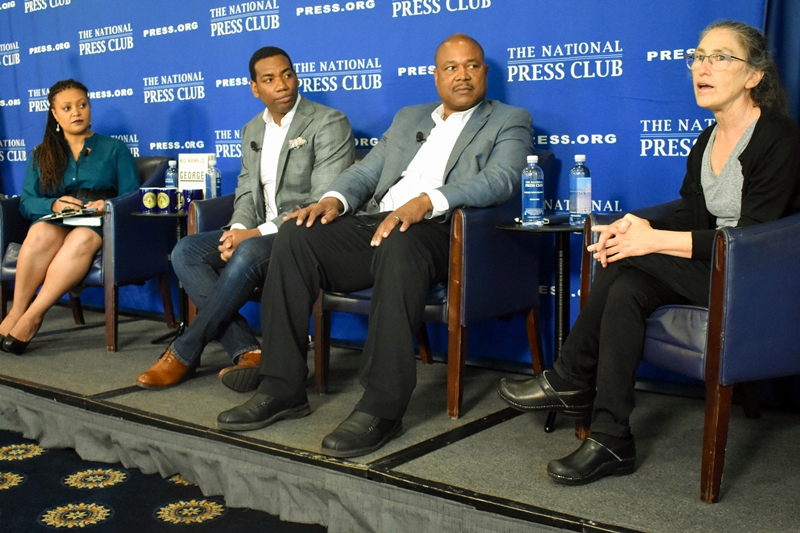Washington Post reporters explore, write about George Floyd's life in new biography
Who was George Floyd and what was it like to live in his America?
Two Washington Post reporters embarked on a mission to discover the man behind the opposing public narratives of George Floyd's life after Minneapolis police officer Derek Chauvin murdered him on May 25, 2020.

One of them, Robert Samuels, spoke to a live National Press Club audience June 23 about what he and Toluse Olorunnipa found and wrote in His Name is George Floyd: One Man’s Life and the Struggle for Racial Justice.
Their book drew from more than 400 interviews with Floyd’s extended family, his girlfriend and friends, his barber “with whom he shared his deepest inner turmoil,” his cellmates, civil-rights leaders, police chiefs, teachers, politicians on city councils, in Congress and the Oval Office, and many more.
Living their own journey as Black men, Samuels and Olorunnipa sought a deeper understanding of Floyd’s life before he was handcuffed on the ground at age 46, gasping for air, crying repeatedly: “I can’t breathe” as Chauvin kept his knee on Floyd’s neck for 9 minutes, 29 seconds.
Floyd’s final words captured on video by a 17-year-old witness prompted protests across the nation and around the world “awakening millions to the racism and widespread abuses” within police forces, noted Kimberly Adams, NPC Board of Governors chair, before introducing Samuels. “I can’t breathe,” she said, was a rallying cry for causes like Black Lives Matter.
Samuels viewed their work as “the most vital and important journalism assignment we had ever taken on.”
In a review, the New York Times called the biography “an intimate, unvarnished and scrupulous account of [Floyd’s] life” that offers “a brilliantly revealing portrait of the structures of poverty, land theft and racism that shaped not only Floyd but also his kinship networks in the South.”
“We wanted people to understand that systemic racism wasn’t a theoretical discussion but something that had real consequences for real people,” explained Samuels who covers the intersection of politics, policy, and people for the Post. “We go back seven generations in his story to the first man in George Floyd’s bloodline to be emancipated,” he said.
Floyd's ancestor "became a wealthy man with lots of property that was then stolen from him” through various taxes and schemes. He couldn’t read because slavery prohibited blacks from reading, Samuels said: “He died a pauper.”
Samuels and Olorunnipa talked to Floyd’s second-grade teacher who saved an “essay” he wrote in her class about wanting to become a Supreme Court justice like Thurgood Marshall. He wrote flawlessly, she told them, a good student at grade level in all subjects. He grew big and tall.
They “gave him a football and a basketball instead of a textbook,” said Samuels. He played sports in college but struggled in life.
Before Floyd's death, the pandemic took his job as a security guard when his workplace closed. In and out of drug programs, moving from Houston to Minneapolis to find a better life, he went to prison for a crime he said he had nothing to do with. A man of faith, “a Godly man, a complicated man,” Samuels told his audience. Floyd’s dreams withered, but he always kept trying, the authors found.
“We didn’t know George Floyd’s life was so emblematic of millions of people, mostly black. We hoped these stories would give a better understanding of who we are,” Samuels said.
Joining Samuels at the Headliners Book Rap were George A. Jones, chief executive officer of Bread for the City, a DC-based charity helping low-income residents reduce the burden of poverty by providing food, clothing, legal and social services, and medical care, and Dr. Randi Abramson, their chief medical officer and an internist in D.C.
“I’ve been pulled out of a car and put on the ground. I’ve felt the fear of not knowing what’s going to happen,” Jones said, before police let him go.
He cried when he read how Floyd and later Duante Wright both cried for their mothers in their final moments at police hands., Jones said., explaining how police were weaponized after emancipation, particularly in the South, to keep black people in check.
He gets pushback, Jones said, when he tells people other institutions “kill black people a lot more frequently than police do.” For example, education: “This country spent two to three hundred years literally keeping black people from being educated. In the last 60 years when Blacks in theory had a chance to get education,” Jones continued, “we get characterized as not being able to be educated.”
Abramson said what she hears from D.C. residents daily “parallels what the book said. As a society we’ve done the wrong thing over and over again. This is the time to make a change.”
Until they began investigating Floyd’s life, Samuels said he had “never considered the relationship between the medical examiner and the police department before.” According to Samuels, studies show that “one in five medical examiners felt pressure to change their diagnosis of what happened because a city official asked them to.”
When Adams posed her final question: “Do you believe we’re headed in the right direction in our fight against systemic racism?” Jones quoted Rev. Martin Luther King Jr: “The moral arc of the universe is long but it bends toward justice.” He added that “each generation moves the needle” against racism and repression” even if it’s not fast enough.
“It’s hard to be hopeful but we have no choice,” Abramson said. “We must be hopeful and we can’t stop working on it!”
Samuels said he talked with Rev. Jesse Jackson who told him that “you have to go back to the beginning” to see improvement.
